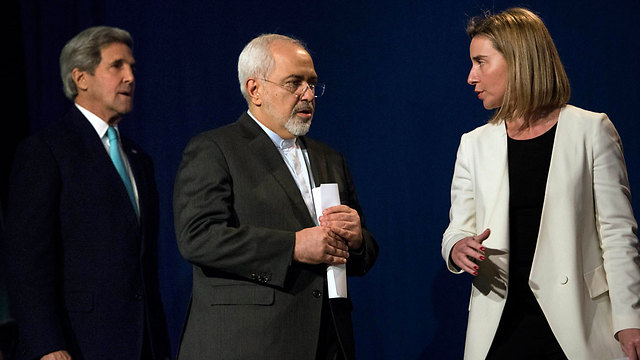
US negotiators. Political solutions are always more complicated than using military force
Photo: AFP
In 2002, Benjamin Netanyahu declared during US congressional hearing that "there is no doubt" that Iraq has weapons of mass destruction and that the way to solve the Iraqi threat is by toppling Saddam Hussein's regime.
As we all know, what happened in practice was different. Iraq did not have weapons for mass destruction and the successful American invasion did not replace Saddam Hussein's tyrannical regime with a stable pro-Western regime. Iraq collapsed, and its collapse only strengthened Iran, which became – thanks to the Bush administration – the most important force in the region.

Toppling the Saddam regime, Netanyahu predicted, would have tremendous positive regional consequences: The region's nations will rise up against their tyrant rulers and the Iranian regime will be undermined or will collapse.
Nuclear Negotiations
Op-ed: Obama may be vague on the details of the final nuclear agreement being drafted, but Israel cannot afford to be.
The war in Iraq didn't lead to the rise of liberal regimes in the region either, but to the development of the Islamic State and other radical Islamic forces. It cost a huge amount of money, which depleted the United States' resources and undermined its standing in the world.

Nuclear talks in Lausanne. Iran's pragmatism convinced the US that Iran is not an 'insane country' like the Islamic caliphates (Photo: Reuters)
It's important to remember these forecasts presented by Netanyahu when we try to understand US President Barack Obama's policy in the Middle East, a policy which Prime Minister Netanyahu is repeatedly presenting as an expression of weakness, feebleness and lack of political vision.
It's not that the developments following the collapse of Saddam Hussein's regime were inevitable. A different American policy could have perhaps maintained Iraq's unity and prevented some of the invasion's negative outcomes. But political solutions are always more complicated than using military force, and a victory in a battle does not guarantee a victory in a war.
The Bush regime, which was enthusiastically supported by Netanyahu, was busy dismantling. What does one do with the dismantled parts? That's a problem. The Iranian nuclear facilities can be attacked, but that is unlikely to solve the problem. Such a strike will gain time. How much time? That's unclear.
Theoretically, Iran can be occupied, but it's pretty clear that the US has neither the resources nor the desire for another long war in the Middle East which will claim a bloody price and could have destructive results. Iran is a much harder nut to crack than Iraq with no air force, which the US defeated in 2003.
On the other hand, it turned out that soft power actually works. The American sanction regime brought down Mahmoud Ahmadinejad and led to the rise of a much more pragmatic regime in Iran. While Iran continues to voice its old insults against the Satans, the big one and the small one, it is actually doing what it stated it wouldn't do – holding negotiations to freeze its nuclear program and silently cooperating with the American effort to restrain the radical Sunni forces in the region.
That doesn’t mean that Iran has become a pro-Western country; it doesn’t even mean that Iran has given up its nuclear dreams. It has definitely not given up its pretension to have the status of a regional power. It means that from an oppositional country operating outside the system, Iran has become part of the system of international agreements.
Iran didn’t enter this system from a position of power but from a position of weakness, weakness which largely stems from the global drop in oil process, which is the result of the American energy policy. From an ideological point of view, Iran would rather denounce the hateful West than cooperate with it, but reality has its own rules. And Iran is not North Korea, a country which no sanction in the world has prevented from reaching nuclear capabilities.
Iran's pragmatism convinced the US that Iran is not an "insane country" like the Islamic caliphates, and is not an reincarnation of Nazi Germany either. It is a rational state, and with rational states it's possible to create a reasonable system of checks and balances.
That doesn’t mean that the agreement lacks problems. There is definitely room to call for a tighter agreement. But this agreement is not a capitulation agreement and is not groundless. It is definitely less groundless than a war in Iran. We have already tried Bibi's "at one stroke" method. It's worth trying something else.















